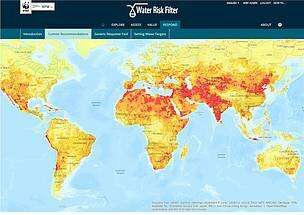Upgraded Water Risk Filter will help companies respond to worsening water risks

With water crises posing a growing threat to the global economy, WWF today announced a major upgrade to its Water Risk Filter, launching a new Respond section that will help companies and financial institutions mitigate water risks to their operations and assets around the world.
Already boasting the best available assessment data, the Water Risk Filter now provides corporates and investors with an innovative and powerful tool to guide and ensure that responses adequately address their water risks – from increasing scarcity to extreme floods to growing social conflict and weak regulations.
Given all the diverse physical, regulatory and reputational water risks facing businesses around the world, WWF developed over 150 different response actions. Based on a comprehensive set of potential mitigation measures, the new Respond section offers users – from multinationals to SMES to financial institutions – a customized and ranked list of recommended actions according to their unique water risk profile.
"Business leaders are finally waking up to the fact that they need to take urgent action to mitigate their water risk or end up with drying and drowned assets – and now they have a tool to help them make the best decisions," said Stuart Orr, WWF Freshwater Practice Lead.
"The World Economic Forum recently ranked water crises as one of the top five global risks by impact – for the 9 th year in a row. But now companies can receive a tailored set of recommended actions to tackle their water risks and safeguard their bottom line: there is no longer any excuse for inaction," added Orr.
Based on WWF's expertise and commitment to support the water stewardship community, each response action in the Water Risk Filter is linked to leading water stewardship frameworks, such as the CEO Water Mandate's Water Stewardship Toolbox, the Alliance for Water Stewardship Standard, Ceres Aqua Gauge, CDP Water Security Questionnaire and UN Sustainable Development Goals. This helps companies to align their water strategies and pursue more effective collective action.
In addition, during its development, WWF worked closely with the multinational fashion company, H&M Group, to refine the Respond section.
"By using water data from over 1000 of our business partners, the new Water Risk Filter Respond section helps us guide and scale up water stewardship efforts in the H&M value chain," said Shariful Hoque, Water Sustainability Responsible at H&M (Global Production). "Next step is a deep dive to set even more specific textile sector actions on our way to becoming fully circular in our business."
Already trusted by thousands of users, the Water Risk Filter had undergone another significant upgrade in 2018, enabling users – such as Germany's largest retailer, Edeka, and Britain's Marks & Spencers – to better explore and assess their water risks.
"As a first step in our water stewardship work with WWF, the Water Risk Filter was used to assess water risks at a global scale across our supply chain. We also conducted a finer scale assessment using the new high resolution data sets in order to better understand local basin risks. The results obtained helped us identify our water risk hotspots and develop systematic approaches to monitor and address these risks," said Rolf Lange, Head of Corporate Communications of EDEKA.
"We believe that the new Respond section of the tool will support our water stewardship efforts and approach even further by helping us identify and prioritize contextual response actions to address our water risks," added Lange.
With freshwater resources under ever increasing strain due to growing demand for water and the impacts of climate change, it is vital that all companies and financial institutions adopt this approach and urgently assess their water risks and take concrete steps to mitigate them.
"Our new Respond section marks a fundamental shift in what the Water Risk Filter can do and how businesses can benefit from it," said Orr. "By tackling their water risk, companies will also support sustainable development by enhancing the health of river basins and wetlands around the world – and all the communities, cities and nature that depend on them."
Developed by WWF and DEG – Deutsche Investitions- und Entwicklungsgesellschaft (the German Development Finance Institution), the Water Risk Filter uses 32 annually updated, peer reviewed data layers along with a site-based operational risk questionnaire to enable users to understand and prioritize water risks and specific sites. Designed to be easy to use by non-water experts, this is the only water risk tool to assess both basin and operational risks.
Drawing on site-specific water risk data, including over 10M km2 of high resolution data, the tool can also guide users towards contextually appropriate mitigation response actions. Already a trusted online tool for corporate water risk assessment, the upgraded Water Risk Filter will guide users along their water stewardship journey from assessment to response to water risks.
Provided by WWF





















